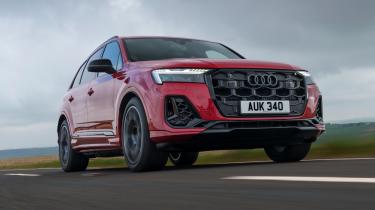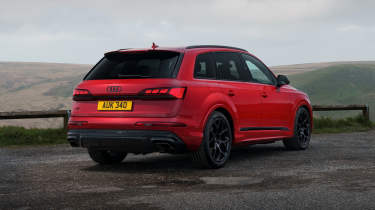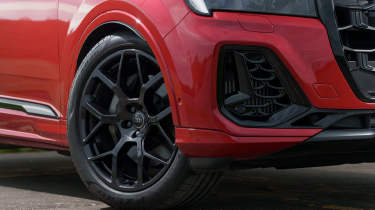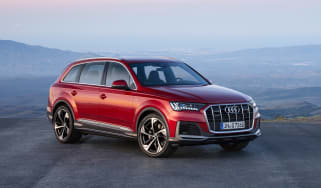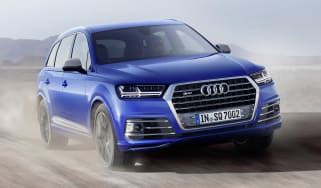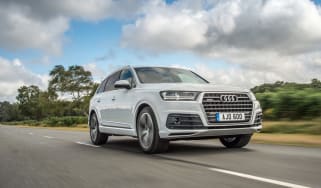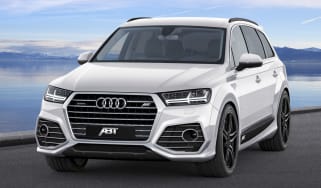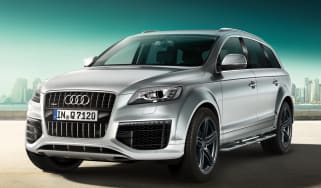Audi Q7 2025 review – BMW X5 rival is an old dog with some new tricks
Higher-tech rivals might outgun the aged Q7 but there's a time-worn appeal and quality feel to Audi's oldest model
evo Verdict
The Audi Q7 as it sits will not be around for long. It endures in this broad second-generation form now a decade on from its introduction. Yet apart from the slightly last-generation interior tech, the appeal it’s always had has not waned in its old age. There will be a new Q7 on sale before the end of next year, with a range of combustion and plug-in hybrid powertrains, but this one is still a reasonably performant, composed, practical and comfortable sub-luxury SUV. Some of its antiquities add appeal, compared to their more modern counterparts found in other more up-to-date Audi models.
Of course the most appealing model in the expansive Q7 range to those of an evo disposition ought to be the SQ7. But that’s hardly a sports car in practical high-rise barge dress. Rather, it’s a faster, slightly more capable flagship, with a more evocative powerplant that’s distantly related to those found in the Audi product much closer to our hearts, the RS6 and RS7.
Audi Q7 history
The Q7 arrived at the right time for Audi. Late to the premium-badged SUV party that the BMW X5 started it might have been, but it was right on time for a brand fostering a bow wave of premium perception. Audi was a powerhouse in the late 2000s and the Q7 was a prong in its premium trident, alongside the R8 sports car/supercar and the S5 coupe. The Q7 looked and felt expensive but unlike its platform mate the Porsche Cayenne, the BMW X5 or the Mercedes ML, it offered seven seats, while not being as egregiously brick-like to look at as the Mercedes GL. It was a model that effectively split the difference in terms of style and practicality, between a Land Rover Discovery and a Range Rover Sport. It always sported Audi’s sense of solidity and cool common sense, lending it a certain inimitable appeal over its rivals.
More reviews
The first-generation car was available with a straightforward range of petrol and diesel engines, crowned by the spectacularly frivolous 493bhp Q7 V12 TDI – a proto-SQ7 in all but name. If only they knew what was to come where the D-word was concerned…
The current, second-generation Q7 arrived in 2015, sporting a range of petrol, diesel and hybrid powertrains, with the 4-litre twin-turbo diesel V8 first appearing in the SQ7 at the head of the range. The later facelifted SQ7 received the more conventional 4-litre twin-turbo V8 found across a number of other Volkswagen Group models. From the beginning and throughout its two facelifts, plug-in hybrid models have featured prominently in the range, making versions of this car, weirdly, never more relevant to UK buyers than they are in 2025.
Audi Q7 in detail
Engine, gearbox and technical highlights > A 3-litre petrol and diesel are available, the latter in two states of tune, also a 3-litre PHEV and the V8 SQ7.
Performance and 0-62mph time > Lighter and more efficient than the first, the Q7’s range of powertrains for the most part make it brisk enough.
Ride and handling > Lighter weight also helps the Q7's dynamics. A relatively compact feel and more car-like body control come thanks to optional 48-volt electronic anti-roll bars and optional rear-steering on Vorsprung cars.
MPG and running costs > Being broad, relatively heavy SUVs, Q7s aren’t the most efficient. 30mpg from the petrol and 35mpg from the diesel can be expected. PHEV Battery will give 25-35 miles of range.
Interior and tech > Interior has vestigial high quality and tactility that’s slightly missing from more up-to-date models. Haptic touch screens are an irritant.
Design > The second-generation Q7's styling was a little more socially acceptable than the behemoth it replaced. It’s been kept contemporary over two facelifts, the latest coming in 2024.
Prices specs and rivals
The Audi Q7 is available with a range of powertrains, from six-cylinder petrols and diesels to plug-in hybrids and a petrol V8 in the SQ7.
Trim lines are split into S Line (from £71,460), Black Edition (from £76,010) and Vorsprung (from £94,060), the latter bringing the most standard equipment, albeit for an extra £23k. For your outlay, you’ll get toys like OLED rear lights, the Bang and Olufsen Sound System, all-wheel-steering (a desirable option on a car so large) and more. The TFSI e Hybrid is substantially pricier (from £77,865 in S-Line spec), though when you factor in the first registration VED savings – £110 rather than over £4000 – the gap is significantly tightened.
For reference, the Audi Q7’s entry price is around £6k less than that of an entry-level Porsche Cayenne, Mercedes GL and Range Rover Sport and around £2k less than the cheapest BMW X5. Aged it may be but the Q7 today represents reasonable value.
